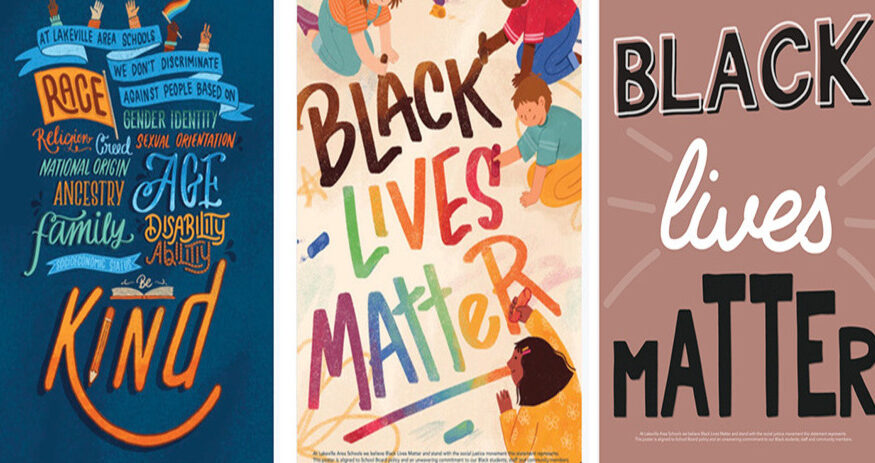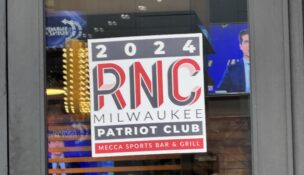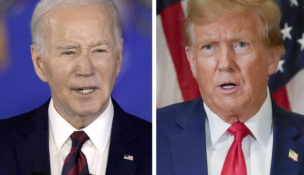Ruling reinstates lawsuit over ‘Black Lives Matter’ school posters
By: Laura Brown//July 3, 2024//
A federal lawsuit brought by parents, minors, and taxpayers of Lakeville School District concerned about “Black Lives Matter” posters in schools has been reinstated by the 8th U.S. Circuit Court of Appeals. The court agreed that the plaintiffs alleged a plausible claim of unconstitutional view discrimination when the district refused to put up “All Lives Matter” and “Blue Lives Matter” posters as well.
Following the murder of George Floyd, teachers at Independent School District 194 requested permission to display “Black Lives Matter” (BLM) posters in classrooms. The District’s superintendent explained in an email that approving the teachers’ request would violate a district policy that prohibits employees from engaging in conduct that is intended to be, or could reasonably be perceived as, endorsing or opposing specific political issues or candidates.
By December 2020, four school board meetings and work sessions had been largely dedicated to discussions of race. During these meetings, outspoken community members urged district administrators to disregard the district policy. Others remained vehemently opposed to the message of “Black Lives Matter.”
Bob Cajune, a Lakeville parent, asked the district to allow posters and shirts displaying the phrases “All Lives Matter” and “Blue Lives Matter” in the district’s schools. However, the director of equity services responded that those “mottos were created specifically in opposition to Black Lives Matter” and “discount the struggle that Black students have faced in our school buildings.”
Cajune, and other named and unnamed plaintiffs, filed a lawsuit under 42 U.S.C. § 1983 against the district and its superintendent, alleging violation of the First Amendment’s Free Speech Clause by rejecting the “All Lives Matter” and “Blue Lives Matter” posters and shirts.
“[N]ine-year-olds within ISD 194 understand this,” the complaint alleged.
The U.S. District Court for the District of Minnesota, in a 2023 decision authored by Judge Jerry Blackwell, concluded that the BLM posters constituted government speech that is not subject to First Amendment challenges.
“Since the summer following Brown v. Board of Education, 347 U.S. 483 (1954), public schools have played a central role in preparing our children to live harmoniously in an increasingly multicultural and diverse country through an integrated educational environment,” Blackwell wrote. “School boards…are tasked with creating an educational environment that prepares young minds to be contributing members of our diverse society. Whether the District accomplished its desired goals for the Inclusive Poster Series is a question to be answered by its residents.”
“But whether the posters are government speech is a question to be answered by the courts, and in this case the Court answers in the affirmative. Plaintiffs’ viewpoints were presented, considered, and not accepted by the District,” Blackwell added.
On appeal, the plaintiffs argued that the content and meaning of the BLM posters were determined by private individuals, and that the district simply gave its seal of approval to the posters. Additionally, the plaintiffs contended that the district created a limited public forum by allowing private individuals to post the BLM posters on the schools’ walls.
“The poster series was designed to convey the private views of some members of the community,” argued James Dickey, senior counsel for the Upper Midwest Law Center. “Those teachers and employees are expressing their private viewpoints by making that decision to post the poster, but, of course, only if they agree with the private activists who initially proposed these posters from the start.”
The district argued that any reasonable member of the public would understand that the district, not private actors, was communicating a message of support to its students. “The district had this months-long discussion about equity, created the poster series, and then its school board chair specifically stood by that poster series, stating ‘We stand behind it, we support Black Lives Matter,’” said Zachary Cronen, shareholder with Squires, Waldspurger & Mace. “The district here was listening to its constituents, both for and against, and decided it wanted to adopt it.”
Judge Raymond Gruender wrote for the 8th Circuit that “the District acquiesced to the wishes of private persons after facing backlash from members of the community.” Moreover, it disagreed with the district, asserting that as individual teachers could decide whether or not to put up the poster, the district relinquished control to private actors.
Having found that sufficient facts were pleaded to support the plausible inference that BLM posters are expressions of private persons, the appellate court agreed with plaintiffs that the district created a limited public forum by allowing private individuals to display BLM posters when it previously restricted the display of such posters. As such, the court determined that district discriminated against speech on the basis of viewpoint by not permitting the “All Lives Matter” and “Blue Lives Matter” with the justification that the phrases were created specifically to oppose “Black Lives Matter.”
“This is a huge victory for free speech and a serious blow to government efforts to pass off private activist speech as its own,” said James Dickey, senior counsel for the Upper Midwest Law Center. ”The government cannot put its thumb on the scale in favor of Black Lives Matter activists against all other speech on issues of race in America.”
In a statement, the school district said, “Lakeville Area Schools has received the decision from the 8th Circuit Court in the Cajune et al. vs. Lakeville Area Schools case. The District is currently reviewing the court’s ruling and considering next steps.”
Legal News
- Outside the RNC, small Milwaukee businesses and their regulars tried to salvage a sluggish week
- Biden called to resign immediately after the president announces he won’t seek reelection
- Biden drops out of 2024 presidential race, endorses Harris
- Local PA cops allegedly thought Trump’s would-be assassin was Secret Service
- Biden-Lead Secret Service admits agency denied past requests by Trump’s campaign for tighter security
- Class action filed against Walgreens
- Former Waukesha County Sheriff’s Office lieutenant pleads guilty to smuggling contraband
- Two dead, one injured after Ozaukee County water rescue
- RNC Final Day: Trump accepts GOP Nomination
- Wisconsin officials intervene in Planned Parenthood action
- 7th Circuit adopts modifications to Rules 31, 34, 40, 47 and 60
- MPD issues statement on outside agency officer assignments
Case Digests
- Ineffective Assistance of Counsel; Double Jeopardy; Sentencing
- Ineffective Assistance of Counsel; Sexual Assault-Prosecutorial Misconduct
- Contract-Negligence
- Criminal Law; Juvenile Law; Discovery
- Family Law; Child Support; Property Division First paragraph(s)
- Ineffective Assistance of Counsel- Exclusion of Evidence of Witness Bias
- Postconviction Relief-Sentencing-Ineffective Assistance of Counsel
- 14th Amendment – Due Process
- Criminal-Sentencing Guidelines – Enhancement
- Bankruptcy-Tax
- Civil Rights – 14th Amendment-Jury Instructions
- Contract; Foreclosure and Property












